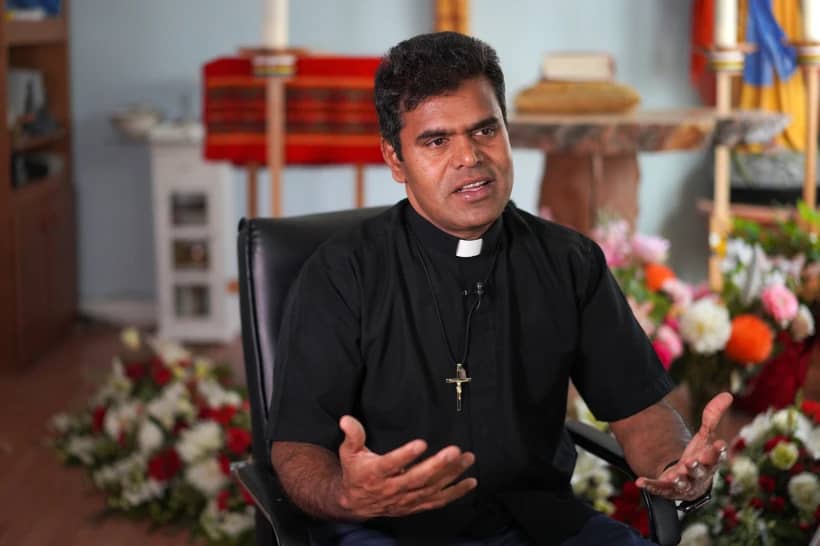Reaction of Catholic bishops to the Supreme Court’s ruling that states cannot ban same-sex marriage Friday was swift, with their top man calling it a “tragic error” and the pope’s top American advisor, Cardinal Sean O’Malley, writing he was “saddened” by the news.
But some US prelates have chosen a different tack, releasing nuanced statements in the hours after the decision that uphold the Church’s teaching on marriage but nonetheless call on Catholics to reflect deeply on the ruling.
Archbishop Blase Cupich of Chicago, in Rome meeting with Pope Francis, called on Catholics to offer a “real” welcome to LGBT people following last week’s Supreme Court decision striking down state bans on same-sex marriage, while reiterating that the Church’s position that sacramental marriage is the union of one man and one woman.
Cupich, handpicked by Francis last year to lead the nation’s third largest archdiocese, highlighted a frequently cited part of the Catechism that says gays and lesbians “must be accepted with respect, compassion, and sensitivity. Every sign of unjust discrimination in their regard should be avoided.”
But he challenged Catholics to go further.
“This respect must be real, not rhetorical, and ever reflective of the Church’s commitment to accompanying all people,” he said in a statement issued Sunday. “For this reason, the Church must extend support to all families, no matter their circumstances, recognizing that we are all relatives, journeying through life under the careful watch of a loving God.”
“The rapid social changes signaled by the Court ruling call us to mature and serene reflections as we move forward together,” Cupich said in a statement. “In that process, the Catholic Church will stand ready to offer a wisdom rooted in faith and a wide range of human experience.”
He said the Church will “hold fast to an authentic understanding of marriage which has been written in the human heart, consolidated in history, and confirmed by the Word of God” and noted that the Court’s 5-4 decision “has no bearing on the Catholic Sacrament of Matrimony, in which the marriage of man and woman is a sign of the union of Christ and the Church.”
Cupich, a moderate among the American hierarchy, also praised the Court’s 6-3 decision upholding the Affordable Care Act, or Obamacare.
“We have issues with provisions of that legislation and will continue to advocate to preserve our religious freedom,” he wrote. “However, we understand that for millions of individuals and families, most of them the working poor, this decision preserves access to health care and the promise it offers of a healthier, longer life.”
Cupich’s statement appears to distance him from the more pointed criticism of the Court’s decision by the head US Conference of Catholic Bishops.
The president of the Conference, Archbishop Joseph Kurtz of Louisville, called the decision “profoundly immoral and unjust” and a “tragic error” in a statement Friday. A handful of other Catholic bishops reacted similarly last week.
Boston’s Cardinal Sean O’Malley, one of Pope Francis’ top advisors, echoed Kurtz’ dire tone.
“Certainly every citizen of this land, regardless of their sexual orientation, deserves to be respected in their personal and civic life,” he said. “But enshrining same sex marriage in our constitutional system of governance has dangers that may become fully evident only over time.”
Cupich isn’t alone in calls for moderation, however.
Archbishop Wilton Gregory of Atlanta, a former president of the USCCB, released a statement Friday noting that the Church’s understanding of marriage “beautifully joins a man and woman in a loving union that is permanent in commitment and open to God’s blessing of precious new life.”
However, he warned those disappointed by the Court’s decision to refrain from “more venomous language or vile behavior against those whose opinions continue to differ from our own.” He said the ruling “confers a civil entitlement to some people who could not claim it before,” but stated that it “does not resolve the moral debate that preceded it and will most certainly continue in its wake.”
Gregory wrote that the decision makes his job “more complex since it demands that I both continue to uphold the teachings on my Church regarding the Sacrament of Matrimony while also demanding that I insist upon respect for the human dignity of both those who approve of the judgment as well as those who may disapprove.”
Bishop Robert McElroy of San Diego said in a statement that the Church “will continue to honor and embody the uniqueness of marriage between one man and one woman as a gift from God,” but “will do so in a manner which profoundly respects at every moment the loving and familial relationships which enrich the lives of so many gay men and women who are our sons and daughters, our sisters and brothers, and ultimately our fellow pilgrims on this earthly journey of life.”
Pope Francis, who met with Cupich Friday in Rome, has repeatedly said that marriage must be a union of one man and one woman, but nonetheless is viewed by progressive Catholics as being more hospitable to gays and lesbians than previous popes.
In October, bishops will gather from around the world for the second part of the Synod on the Family, which is expected to include a discussion of pastoral care for LGBT Catholics.
Cupich was elected by the USCCB to serve as an alternate American delegate for the synod, though some Catholics wonder if Francis will appoint him as one of his special delegates.













